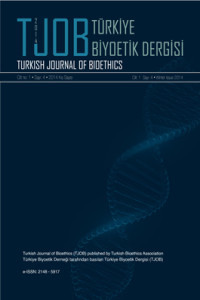Acceptability, Equality, and Equity: A Fair Allocation Model for Scarce Healthcare Resources During Pandemics and Natural Disasters
Abstract: The COVID-19 pandemic has necessitated revisiting the matter of allocating scarce healthcare resources. During pandemics and natural disasters, applying certain allocation methods is inevitable due to an uncontrollable surge in the need for scarce resources, and those methods should distribute potential benefits and burdens according to the principle of justice. This article briefly studies four allocation models and proposes a new approach to maximize total benefits with social and ethical acceptability, equality, and equitability. For accomplishing that goal, the Acceptability, Equality, and Equity (AEE) model recommends six principles, atransparency and equal treatment, b- objective assessment and supervision, c- sustaining ongoing treatments, d- priority to individuals performing crucial tasks, e- scoring system, and f- lottery for individuals with the same conditions. The AEE model suggests allocating scarce resources not only based on medical facts but also social and ethical considerations, such as sustaining ongoing medical procedures for patients who are undergoing medical treatment and winning public support through transparent, objective, and fair implications.
Özet: COVID-19 salgını, sınırlı sağlık kaynaklarının tahsisi konusunun yeniden gözden geçirilmesini gerektirmektedir. Pandemiler ve doğal afetler sırasında sınırlı kaynaklara olan ihtiyacın hızlı bir biçimde artması nedeniyle belirli tahsis yöntemlerinin uygulanması kaçınılmazdır ve bu yöntemler potansiyel fayda ve yükleri adalet ilkesi çerçevesinde dağıtmalıdır. Bu makale kısaca dört tahsisat modelini incelemekte ve toplam faydayı en üst düzeye çıkarmak için, sosyal ve etik kabul edilebilirlik, eşitlik ve hakkaniyet paralelinde yeni bir yaklaşım önermektedir. Bu amaca ulaşmak için Kabul Edilebilirlik, Eşitlik ve Hakkaniyet (KEH) modeli altı ilke önerir: a- şeffaflık ve eşit muamele, b- objektif değerlendirme ve denetim, c- devam eden tedavileri sürdürme, d- önemli görevleri yerine getiren bireylere öncelik, e- puanlama sistemi ve f- aynı koşullara sahip bireyler için çekiliş. Önerilen model, kaynakların sadece tıbbi gerçeklere değil, aynı zamanda tedavi gören hastalar için devam eden tıbbi prosedürlerin sürdürülmesi gibi sosyal ve etik hususlara dayalı olarak tahsis
edilmesini amaçlamaktadır.
Anahtar Kelimeler:
Pandemics, natural disasters, scarce resources, acceptability, equality, equity
Acceptability, Equality, and Equity: A Fair Allocation Model for Scarce Healthcare Resources During Pandemics and Natural Disasters
Abstract: The COVID-19 pandemic has necessitated revisiting the matter of allocating scarce healthcare resources. During pandemics and natural disasters, applying certain allocation methods is inevitable due to an uncontrollable surge in the need for scarce resources, and those methods should distribute potential benefits and burdens according to the principle of justice. This article briefly studies four allocation models and proposes a new approach to maximize total benefits with social and ethical acceptability, equality, and equitability. For accomplishing that goal, the Acceptability, Equality, and Equity (AEE) model recommends six principles, atransparency and equal treatment, b- objective assessment and supervision, c- sustaining ongoing treatments, d- priority to individuals performing crucial tasks, e- scoring system, and f- lottery for individuals with the same conditions. The AEE model suggests allocating scarce resources not only based on medical facts but also social and ethical considerations, such as sustaining ongoing medical procedures for patients who are undergoing medical treatment and winning public support through transparent, objective, and fair implications.
--
Özet: COVID-19 salgını, sınırlı sağlık kaynaklarının tahsisi konusunun yeniden gözden geçirilmesini gerektirmektedir. Pandemiler ve doğal afetler sırasında sınırlı kaynaklara olan ihtiyacın hızlı bir biçimde artması nedeniyle belirli tahsis yöntemlerinin uygulanması kaçınılmazdır ve bu yöntemler potansiyel fayda ve yükleri adalet ilkesi çerçevesinde dağıtmalıdır. Bu makale kısaca dört tahsisat modelini incelemekte ve toplam faydayı en üst düzeye çıkarmak için, sosyal ve etik kabul edilebilirlik, eşitlik ve hakkaniyet paralelinde yeni bir yaklaşım önermektedir. Bu amaca ulaşmak için Kabul Edilebilirlik, Eşitlik ve Hakkaniyet (KEH) modeli altı ilke önerir: a- şeffaflık ve eşit muamele, b- objektif değerlendirme ve denetim, c- devam eden tedavileri sürdürme, d- önemli görevleri yerine getiren bireylere öncelik, e- puanlama sistemi ve f- aynı koşullara sahip bireyler için çekiliş. Önerilen model, kaynakların sadece tıbbi gerçeklere değil, aynı zamanda tedavi gören hastalar için devam eden tıbbi prosedürlerin sürdürülmesi gibi sosyal ve etik hususlara dayalı olarak tahsis edilmesini amaçlamaktadır.
Keywords:
Pandemics, natural disasters, scarce resource, acceptability, equality, equity,
- ISSN: 2148-5917
- Yayın Aralığı: Yılda 4 Sayı
- Başlangıç: 2014
- Yayıncı: Türkiye Biyoetik Derneği
